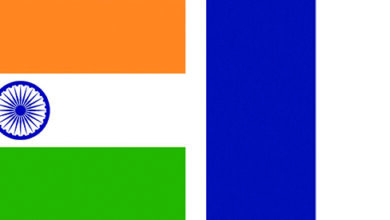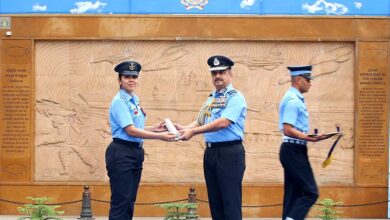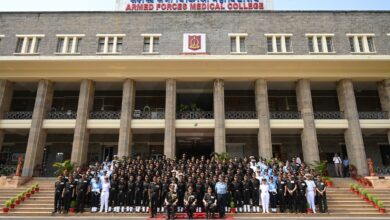The 1971 Bangladesh Liberation War and Surrender of Pakistani Army
- Some Interesting Nuggets
By Gulshan Luthra
Here is Lt Gen Amir Abdullah Khan Niazi, famously known as Lt Gen AAK Niazi, Commander of Pakistan’s Eastern Command, signing the Instrument of Surrender to end the Bangladesh Liberation War on 16 December 1971.
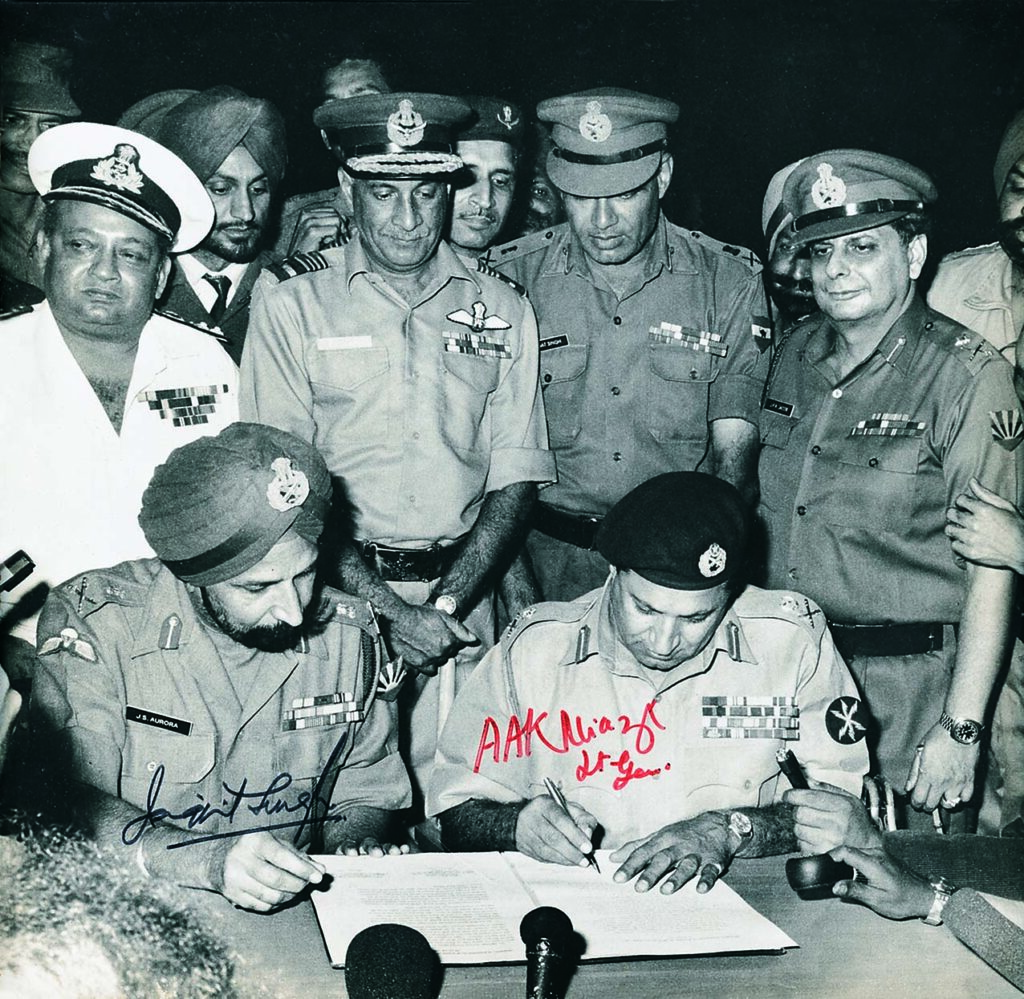
He surrendered to Indian Army’s Lt Gen Jagjit Singh Aurora, General Officer Commanding in Chief (GOC-in-C), Eastern Command and more than 93,500 Pakistani Army, Air Force and Navy officers and personnel laid down their arms before the Indian Army all across the newly-liberated country of Bangladesh.
The Indian Air Force dominated the East Pakistan skies while the Indian Navy blockaded its ports. The badly wounded Pakistan army itself called for a unilateral ceasefire. Maj Gen (Later Lt Gen) Jack Farj Rafael Jacob, Lt Gen Aurora’s Chief of Staff, gave him 30 minutes to surrender instead, warning that else the Indian Army would resume its attacks. Gen Niazi agreed.
The Pakistanis were in a hopeless situation, and as the events progressed, the Indian Army was on the outskirts of Dacca. Maj Gen GS Nagra, GOC 101 Area, sent a handwritten note through his ADC Capt Hitesh Mehta and Capt Nirbhay Sharma (later Lt Gen) to Gen Niazi. It read: My Dear Abdullah, I am here. The game is up. I suggest you give yourself up to me and I will take care of you.”
Gen Niazi had requested the Indian Army Chief General Sam Manekshaw for a ceasefire. The decision at the Indian Army HQ was for a surrender, which, in any case, was inevitable and the only option before the Pakistani Army. Gen Jacob was resolute in his demand for surrender, and made sure of that.
The Indian Army had also demoralised the Pakistani soldiers by reminding them, through airdropped leaflets and radio broadcasts, of their hopeless situation as well as the anger of the Bengalis who wanted to lynch them.
I used to share the front seats with Gen Jacob at the Institute for Defence Studies and Analyses (IDSA), the think tank of the Ministry of Defence, sitting next to him occasionally. Once I asked him what would have happened if the Pakistanis had not surrendered. They had no reinforcements of men, and no supplies of materials from West Pakistan due to the Indian Navy’s blockade, so a few more days of fighting and many more casualties for them, was his answer.
RAW’s Role
Two more things happened. The Indian Air Force had airdropped a battalion-size group of about 450 paratroopers using a composite transport aircraft force consisting of An-12s, Packets, Dakotas and Caribous at Tangail on the outskirts of Dacca.
Somehow, thanks to the intervention of India’s newly-set up RAW intelligence agency, the most trusted BBC radio amplified this figure by 10 times to 4,500.
Those were the days of limited paradrop, and after Gen Niazi was formally taken into custody, he was most inquisitive about these 4,500 para commandoes. The apprehending officer – I met him but am forgetting his name – was himself surprised at this figure, and told him the truth that There Were Only About 450 Paras.
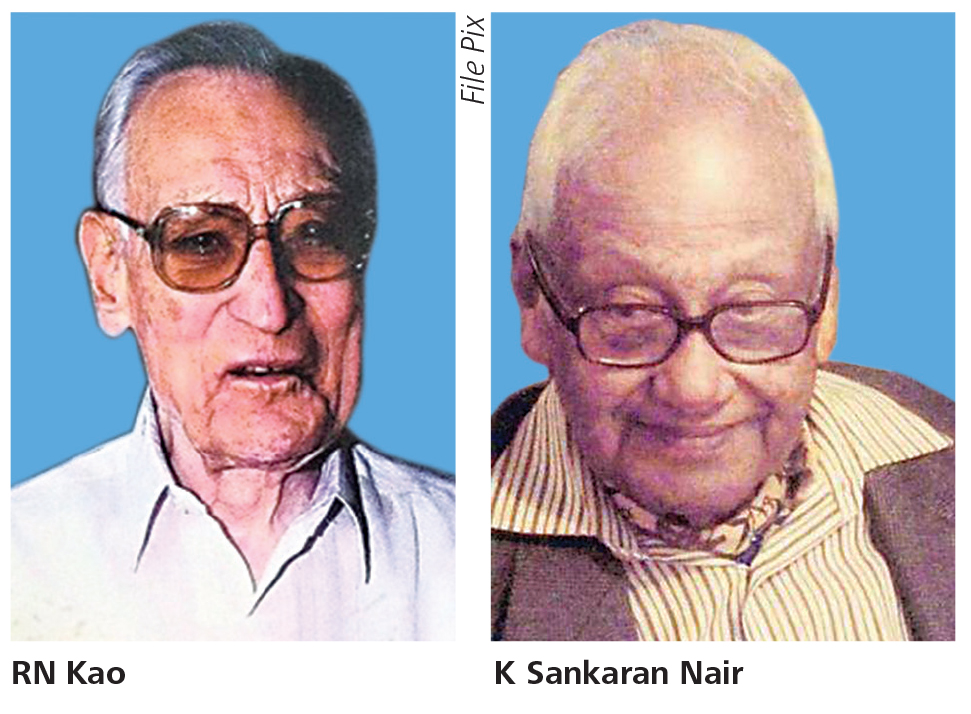
RAW, or Research and Analysis Wing, India’s external intelligence agency, played a key role in the war. It was set up in 1968 by Mr RN Kao, a distinguished Indian Imperial Police (IP) officer. His Number 2, K Sankaran Nair, also an IP officer, was perhaps responsible for this disinformation to the media, and in the fog of war, BBC carried the report further demoralising the Pakistanis.
I had a chance to meet Mr Nair when he was shunted out of RAW and appointed Secretary to the Minorities Commission, then headed by Air Chief Marshal Arjan Singh, by Prime Minister Morarji Desai, who for whatever reason, wanted to disband RAW. The two Spymasters rarely spoke a word although Mr Nair did share a few nuggets as I met him routinely while covering the Minorities Commission on behalf of UNI news agency.
He was the last of the IP officers trained during the British era.
Mr Kao had handpicked his officers while setting up RAW, mostly from Military and Civil Services but also from other walks of life.
Kao and Nair were powerful men, reporting direct to the Prime Minister, Mrs Indira Gandhi. RAW itself was part of the Cabinet Secretariat, and both these men were highly trusted by the Prime Minister who was literally tired of Pakistan’s diatribes and sabotage activities against India. It was RAW’s job to counter the Pakistani campaigns, particularly outside India, but during the war, its contribution was decisive.
Morarji Desai, who succeeded Mrs Gandhi after she lost the elections in 1977 post-Emergency, refused to see the two Spymasters, asking them instead to report to the Cabinet Secretary, the highest officer of the country, Mr Nirmal Kumar Mukherjee, an Indian Civil Service Officer (ICS).
Desai wanted to disband RAW, and that troubled Mukherjee. He was a good bureaucrat, as one should be, and stonewalled Desai’s decision. Nonetheless, at Morarji Desai’s insistence, Kao was retired and replaced while Nair was assigned to the Minorities Commission, a most uncomfortable entity for him.
The British did really set up a steel frame in their ICS and IP Civil Services, which became IAS and IPS after India’s independence.
There was another incident which dampened the spirits of Pakistani officers – they did enjoy good whiskeys then though.
On 14 December 1971, Wg Cdr (later Air Vice Marshal) Bhupendra Kumar Bishnoi, was tasked to hit the Government House in Dacca where a top-level meeting was scheduled. The target was actually assigned to him at the last moment when he was already strapped up in his MiG-21 cockpit at Gauhati IAF base – leading a 4-aircraft formation for a different target close to Dacca (now Dhaka). The new target’s location and coordinates were unknown to him but for a tourist map of Dacca that had the Government House marked. It was handed over to him at the last minute by an airman, standing on the aircraft ladder, after helping Bishnoi strap up.
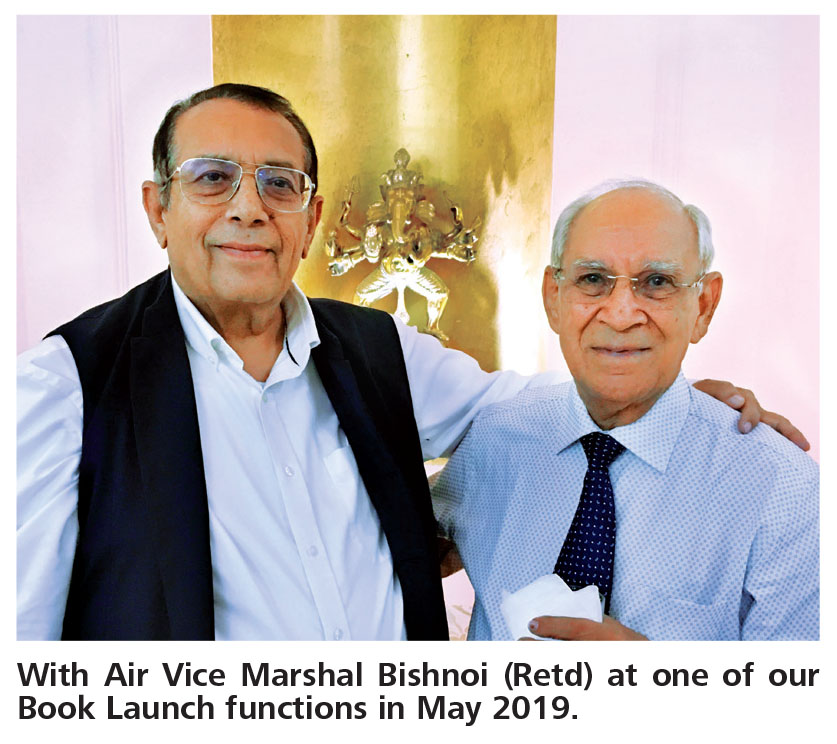
That was the era when there were no precision weapons. But Lady Luck was surely with Wg Cdr Bishnoi as he not only identified the sprawling Government House in the very first pull up over the city, the salvo of rockets fired by him from his Mig 21 in the ensuing dive somehow found its way through the ceiling ventilators, exploding on the Governor’s conference table. The Governor, Abdul Motaleb Malik, was so jolted by the attack that he resigned there and then, signing with a ballpoint pen in his shaking hands on a scrap of paper.
There was no choice for the Pakistanis but to surrender; that was it.
Role Reversal to Protect the Pakistani Army
Once the Surrender terms were enforced, the Indian Army, which had just defeated the Pakistani forces, reversed its role to protect its personnel from Bengali wrath, triggered by murders, kidnappings and rapes they had inflicted on the locals. The Bengalis wanted to lynch the West Pakistanis, and were actually upset with India for giving protection to “these horrible murderers.” Lt Gen Niazi personally requested protection for himself and his troops, and expressed gratitude to Gen Aurora for according him a promise on this.
Prime Minister Indira Gandhi and Gen Sam Manekshaw ordered that no harm should come to the Pakistani Prisoners of War (POWs), and to ensure their safety, all of them were speedily shifted to India in Indian Army Camps.
India held the largest number of POWs anywhere ever in history; they were treated well, given the same rations and clothing as the level of their Indian counterparts, and there was no report of mistreatment of even one Pakistani. In fact, one of the PAF officers in an Indian POW Camp, Pervaiz Mehdi Qureshi, became the Pakistan Air Force Chief of Staff later, and praised the Indian Army for the professional and decent treatment of Pakistani POWs.
Those repatriated to Pakistan included some 400 Pakistani spies who had infiltrated into India after the East Pakistan crisis erupted over denial of the country’s leadership to Shaikh Mujibur Rahman who had won the national elections. The West Pakistani establishment had said Nothing Doing.
Gen Niazi himself was in Indian Army’s custody for four years as a POW. After he was repatriated at the Wagah-Atari border, he was dishonoured and his military ranks taken away.
Incidentally, Gen Niazi was an uncle of the present Pakistan Prime Minister Imran Khan.
(Repeated from December 2020)



